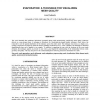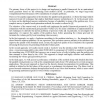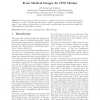IMR
1999
Springer
15 years 6 months ago
1999
Springer
The work described here addresses information generated during mesh preprocessing, specifically mesh quality indicators derived on a per-element basis. A technique is introduced f...
134
click to vote
IMR
1999
Springer
15 years 6 months ago
1999
Springer
Considerable progress has been made on automatic hexahedral mesh generation in recent years. Several automatic meshing algorithms have proven to be very reliable on certain classe...
129
click to vote
IMR
1999
Springer
15 years 6 months ago
1999
Springer
The primary focus of this project is to design and implement a parallel framework for an unstructured mesh generator based on the advancing front method (AFM). In particular, we t...
IMR
1999
Springer
15 years 6 months ago
1999
Springer
110
click to vote
IMR
1999
Springer
15 years 6 months ago
1999
Springer
In computational simulation of coupled, multicomponent systems, it is frequently necessary to transfer data between meshes that may di er in resolution, structure, and discretizat...
ECAL
2001
Springer
15 years 7 months ago
2001
Springer
Amorphous computing is a recently introduced paradigm that favours geometrical configurations. The physical layout of an amorphous computer is based on a possibly irregular and er...
138
click to vote
IMR
2003
Springer
15 years 7 months ago
2003
Springer
This paper proposes a method for predicting the complexity of meshing Computer Aided Design (CAD) geometries with unstructured, hexahedral, finite elements. Meshing complexity ref...
108
click to vote
IMR
2003
Springer
15 years 7 months ago
2003
Springer
In this study, an automated adaptive mesh control scheme, based on local mesh modifications, is developed for the finite element simulations of 3D metal forming processes. Error i...
114
click to vote
IMR
2003
Springer
15 years 7 months ago
2003
Springer
Finite element analysts and designers need to feel confident in the results of their analyses before sending a product to prototype or production. Mesh discretization can greatly ...
109
click to vote
IMR
2003
Springer
15 years 7 months ago
2003
Springer
Topology modification of hexahedral meshes has been considered difficult due to the propagation of topological modifications non-locally. We address this problem by working in the...



